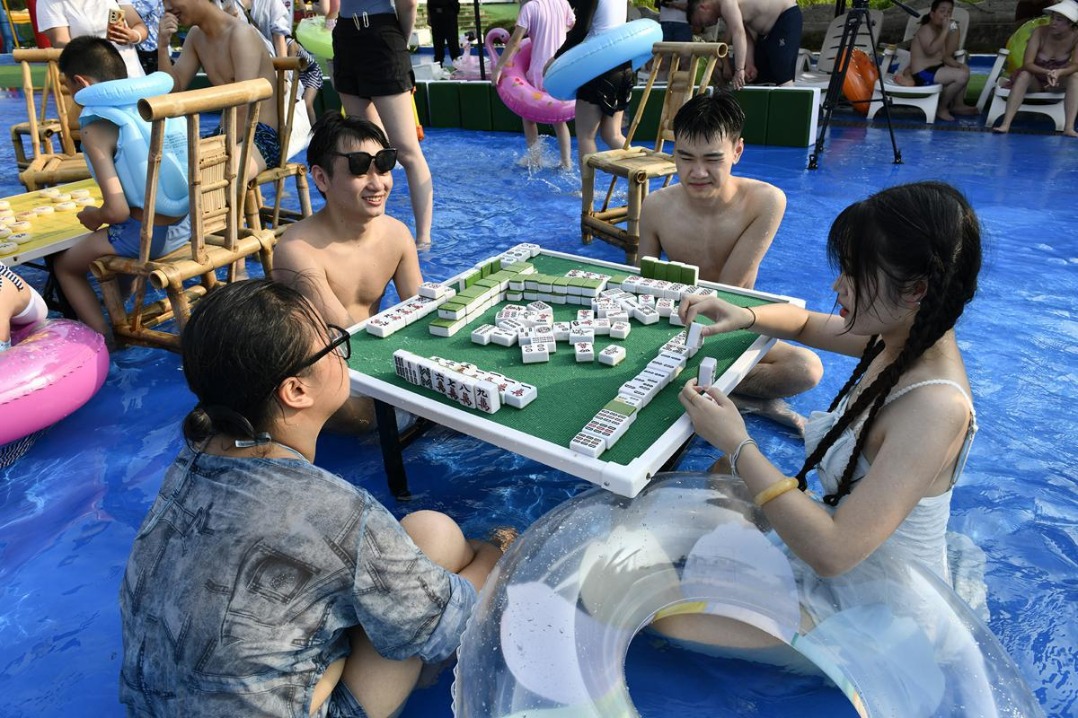Science meets education — China turns to schools to help build sci-tech powerhouse

BEIJING -- A high-tech show was staged recently at the playground of a primary school in a small county. Students seated in a circle were captivated by a robot dog skilled at flipping over and dancing. It even made a bow and shook hands with the audience.
"I got to touch the robot dog, and it was so interesting. I will work hard and learn more about it," said Mou Yuejia, a student at the primary school in Tonghai county, Southwest China's Yunnan province.
The show was part of an activity held to popularize science and technology upon campus. It featured exhibits about ecological protection, sci-tech innovation and some instruments demonstrating how to generate wind power.
"Next we will get in closer touch with schools and present the latest sci-tech results to students to inspire their interest and help increase people's knowledge of science," said Ding Chao, chairman of the science and technology association of Tonghai county, which organized the event.
Since mid-September, a wave of science popularity has swept across China, with some 200,000 activities of various types held on the theme of raising scientific literacy among the public and contributing to building a country that leads in science and technology.
Beyond the science popularization activities, Chinese schools are also springing in action on their own. This autumn semester, many schools made adjustments to their science courses in alignment with the frontiers of new technologies and explored new ways to make such classes more attractive.
Pouring water, oil and effervescent tablets into a cup, Feng Jiaqi, a pupil at a primary school in the city of Zhengzhou, deftly conducted a scientific experiment simulating volcanic eruptions. "As the density of water is bigger than oil, the two will be clearly divided, with oil on top of water," Feng explained.
The school in the capital of Central China's Henan province added scientific practice courses and arranged more science classes for its first- and second-grade students this semester.
In East China's Fujian province, more than 300 university-based laboratories and science and technology museums were engaged in tailoring off-campus science classes for primary and middle school students. They customized the procedures of such classes together with teachers.
"There will inevitably be all kinds of problems in the process of exploring science, from which students can have a real experience of scientific practice," said Cai Minggang, a professor at Xiamen University.
In December 2023, Fujian put forward 20 measures to improve science education, including deepening curriculum and teaching reforms, improving education resources and giving play to the public sites that are suitable for science popularization.
In particular, it required opening such sites as science and technology museums, observatories, and memorial halls of scientists to primary and middle school students free of charge. Some research institutes were made open to the public for the first time, covering the sectors of science, agriculture and environment.
These local efforts were made in response to a set of guidelines on strengthening the education of science for primary and middle school students that was released by the Ministry of Education and 17 other authorities last May.
The document urged efforts to mobilize social forces such as universities, research institutes, children's palaces, museums and libraries to open their respective venues, bases, parks or even production lines to students to help underpin scientific practice education.
The latest statistics show that there are 1,683 sci-tech and related museums across the country, of which 1,090 are free to the public.
People's scientific knowledge to some extent determines the country's development in the sector of science and technology. China aims to become a global leader in science and technology by 2035. Taking education and technology as basic underpinnings for Chinese modernization, it is committed to the strategy of invigorating China through science and education.
"Social forces have rich resources for education on science and have widened the boundary of education," said Huang Xiao, dean of the College of Education, Zhejiang Normal University, calling for greater efforts to build consensus, do a good job of top-level design and optimize resource layout to further improve science education.
- Domestic single-dose flu drug approved
- Water mahjong games cool visitors in Chongqing
- Sanya to host sixth Asian Beach Games in April
- Guangdong, Hong Kong and Macao to jointly hold entrepreneurship competition
- China approves rice-derived recombinant human albumin injection
- Hundreds attend 5th TCM Culture Festival in Tianjin





































